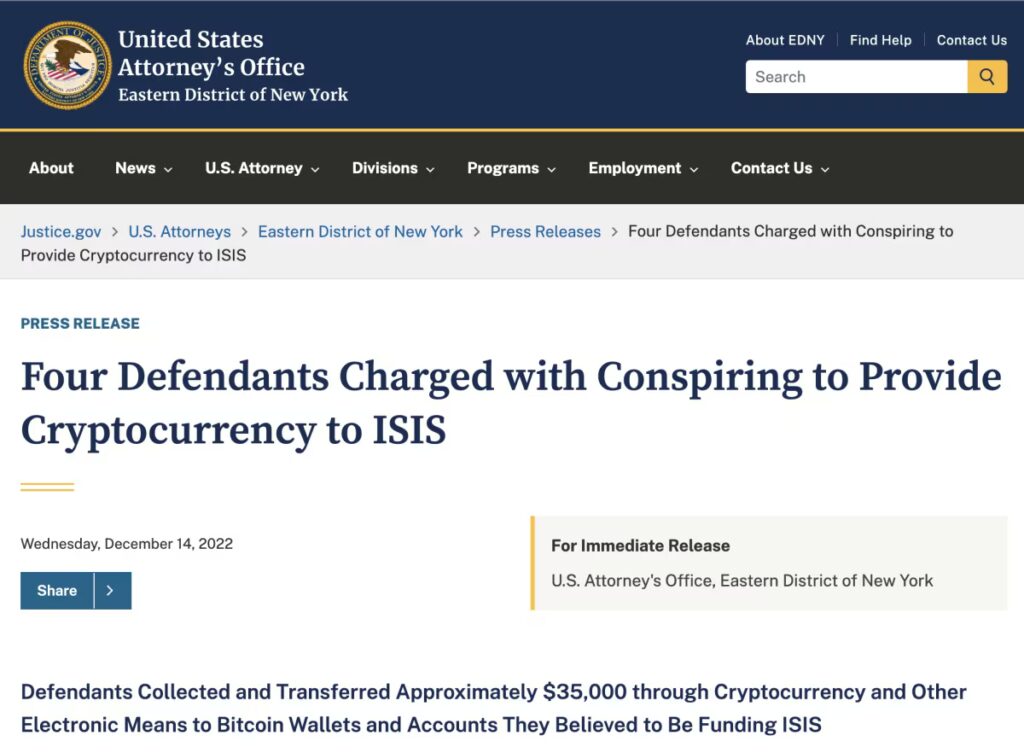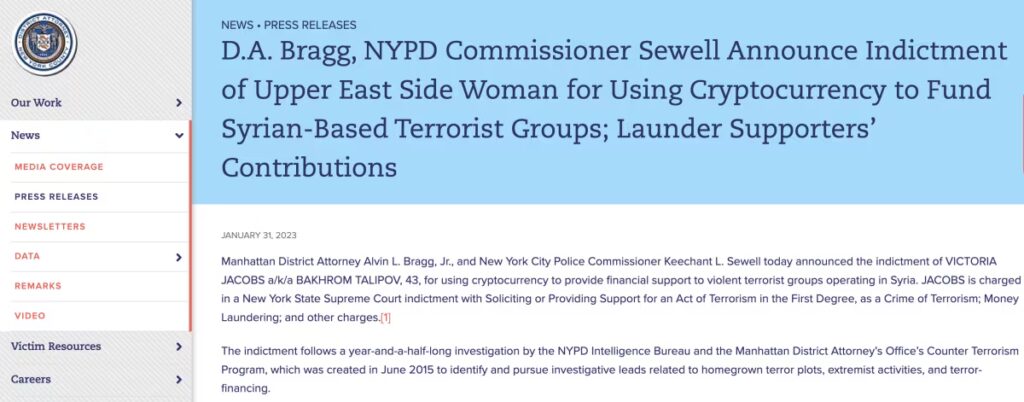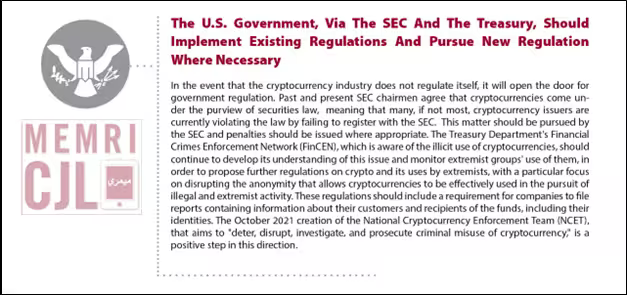Introduction
Since the MEMRI Jihad and Terrorism Threat Monitor (JTTM) published its seminal report The Coming Storm – Terrorists Using Cryptocurrency on August 21, 2019, the JTTM research team has continued to monitor jihadi use of cryptocurrency along with MEMRI’s Cyber & Jihad Lab (CJL), which focuses on jihadi use of emerging technologies such as encryption, artificial intelligence, drones, bots, and cryptocurrency. Since its inception 15 years ago, it has worked with legislatures and tech companies to develop strategies to counter terrorists’ use of such technologies.
These groups have most recently been using cryptocurrencies in a range of ways: Pro-Islamic State (ISIS) websites are raising funds using cryptocurrency and have published English-Arabic dictionaries of cryptocurrency terms; Pro-Al-Qaeda groups in Syria and jihadi groups in Gaza have raised cryptocurrency to fund military action; Russian-speaking pro-jihadi groups have called for donations using cryptocurrencies; Iran-backed militias in Iraq have promoted a website that purports to sell U.S. and NATO weapons using cryptocurrency.
The following report will review recent arrests and notable examples of jihadi groups’ use of cryptocurrencies – Bitcoin, Monero, Ethereum, Zcash, Toncoin, and others – covering activity since MEMRI’s previous report on this topic was released.
Ongoing Arrests In The West Of Supporters Of Jihadi Organizations Using Cryptocurrency To Send Funds To Terrorist Organizations
Such fundraising efforts have often been taken up by jihadi supporters in the West, and in recent months there have been a number of notable high-profile arrests, including examples of usages found in MEMRI’s previous report on terrorist use of cryptocurrencies. In early May 2023, authorities arrested 33-year-old Mohammed Azharuddin Chhipa at his Virginia apartment on charges of having sent $61,000 in virtual currency to ISIS-controlled accounts. Chhipa reportedly has a “husband-wife relationship” with Kansas native Allison Fluke-Ekren, likely meaning that the two are religiously but not legally married. In Syria, Fluke-Ekren led an all-female ISIS batallion of 100 woman and girls, some as young as 10 years old, who were taught to use automatic weapons and grenades and to detonate suicide belts. Fluke-Ekren is now serving a 20-year prison sentence.
On December 14, 2022, the New York Attorney General’s Office announced that four men had been arrested in Virginia, New York, and New Jersey, and charged with conspiring to provide material support to the Islamic State (ISIS), having used “cryptocurrency, Bitcoin wallets, GoFundMe, and PayPal” to raise over $35,000 in funds.

On January 31, 2023, the Manhattan District Attorney’s office announced the indictment of 43-year-old Victoria Jacobs, aka Bakhrom Talipov, for using cryptocurrency to provide financial support to violent terrorist groups operating in Syria. She is alleged to have sent over $5,000 to “Malhama Tactical,” a terrorist group that fought with and trained Hay’at Tahrir Al-Sham (HTS). She also allegedly laundered $10,661 on behalf of Malhama Tactical by receiving cryptocurrency along with Western Union and MoneyGram wires from supporters around the globe and sending the funds to Bitcoin wallets controlled by Malhama Tactical.

In addition to those arrests, this past year there have been developments with U.S. government agencies and activity on capitol hill to address jihadi use of cryptocurrencies. The Commodity Futures Trading Commission (CFTC), an independent U.S. government agency, sued Binance, the world’s largest cryptocurrency exchange on March 28, 2023, for allegedly allowing Americans to trade in crypto derivatives.
A CFTC court filing asserts that Binance was aware that Hamas terrorists were using its platform for illegal activity. It reads: “Internally, Binance officers, employees, and agents have acknowledged that the Binance platform has facilitated potentially illegal activities. For example, in February 2019, after receiving information ‘regarding HAMAS transactions’ on Binance, Lim explained to a colleague that terrorists usually send ‘small sums’ as ‘large sums constitute money laundering.’ Lim’s colleague replied: ‘can barely buy an AK47 with 600 bucks.'” The National Bureau for Counter Terror Financing (NBCTF) reported that two Binance accounts had been seized in January 2023 to “thwart the activity” of ISIS and “impair its ability to further its goals.”
Hamas Military Wing ‘Izz Al-Din Al-Qassam Brigades – Designated Terrorist Organization That Uses Cryptocurrency For Funding – Stops Accepting Cryptocurrency Following U.S. And Israeli Action Against Them
Reflecting authorities’ increasing ability to track cryptocurrencies, on April 26, 2023 the ‘Izz Al-Din Al-Qassam Brigades, Hamas’s military wing, announced on its official website that it is no longer accepting donations in Bitcoin. The group explained that its decision was “out of concern for the safety of donors and to not expose them to any harm, particularly in light of the intensification of harassment and the redoubling of hostile efforts against anyone who tries to support the resistance using this currency.”

It was reported, on May 4, 2023, that in the past two years Israel has seized nearly 200 cryptocurrency accounts at the Binance cryptocurrency exchange, including two it said were linked to ISIS and dozens of others it said were owned by Palestinian firms connected to Hamas, which has been designated a terrorist organization by dozens of countries, including by the U.S. since 1997. Israel Defense Ministry documents dated January 12, 2023 gave details of the seizure of the two accounts it said were linked to ISIS.
Global Arrests Of Jihad Supporters Using Cryptocurrency
In addition to U.S. government activities to address terrorist usage of cryptocurrencies, countries around the world have become aware of this problem and as a result there have been arrests and other activities. For example, in France, two men who had sent $280,000 worth of cryptocurrency to jihadis in Syria were sentenced to prison, on September 19, 2022. Two years previously, in September 2020, French authorities had arrested 29 people in connection with a complex scheme to finance Islamist extremists in Syria using cryptocurrencies. A 31-year-old Uzbek man and a 29-year-old Kazakh man living in South Korea were arrested in February 2023 for sending about $8,500 in cryptocurrency to Katibat al Tawhid wal Jihad (KTJ), an anti-Syrian-government terrorist group affiliated with Al-Qaeda.
Congressional Bill To Study How Terrorists Use Cryptocurrency
A bipartisan bill introduced in the U.S. Senate and House of Representatives on April 27, 2023 – the Financial Technology Protection Act – calls on the federal government to study how cryptocurrencies are used for illegal activity and to recommend ways to mitigate these uses. The act would establish a working group to study how terrorists or other criminals might use cryptocurrencies and other new financial technologies, and to propose means of countering these uses to Congress and regulatory agencies. Jim Himes (D-CT), who is the ranking member on the House Intelligence Committee and one of the bill’s co-sponsors, said: “The rapid evolution of our financial systems demands increased attention to reduce risk and combat abuse by terrorist organizations.”
If formed, this working group would comprise representatives from the U.S. Treasury Department, Financial Crimes Enforcement Network (FinCEN), the Office of Foreign Asset Control (OFAC), the Departments of Justice, State, and Homeland Security, the Drug Enforcement Administration, and the CIA, FBI, and IRS, as well as representatives from the industry and from analytics firms, financial institutions, and research organizations.

Recommendations For Tackling Jihadi Uses Of Cryptocurrency
During MEMRI briefings to government agencies during 2018 and 2019 and as part of our initial study, recommendations were often made on what can be done to address the issue of terrorist use of cryptocurrencies, including calling for a Capitol Hill study group on the issue. Additionally, below are some of these recommendations that were issued in the briefings for actions that could be taken to stop jihadi uses of cryptocurrency, which remain relevant today.












Pro-ISIS Website Wishes Muslims A Ramadan Of Conquests, Fundraises In Monero; Readers Discuss, Advise On Using Cryptocurrency
On March 22, 2023, a user of the ISIS-operated Rocket.Chat server posted a message from a popular pro-ISIS website along with a link to it. The message opened with congratulations for the advent of the Islamic holy month of Ramadan.
The site is protected by the U.S.-based reverse proxy service Cloudflare and is hosted on the French Association for Cooperative Internet Naming (AFNIC) server in the French South Pacific Wallis and Futuna Islands.
Ramadan Greetings – “Make It A Month Of Conquests”
The website’s message stated: “We congratulate Muslims on the advent of the blessed month of Ramadan, asking Allah Almighty to make it a month of conquests and empowerment for Muslims and of misfortune for the unbelievers.”

Soliciting Donations In Monero; Readers Discuss, Advise On Using Cryptocurrency
The Al-Ra’ud Media Archive website solicits donations but provides no information as to how the funds would be used. The website includes an embedded QR code for donations in Monero and the wallet address:
 Eurasia Press & News
Eurasia Press & News




